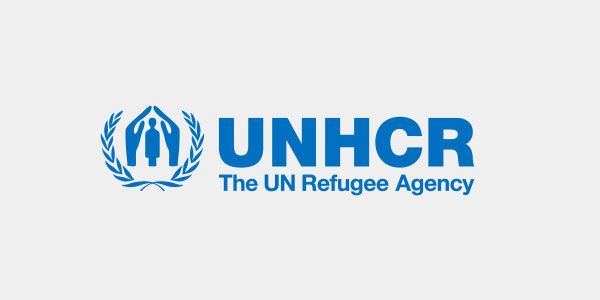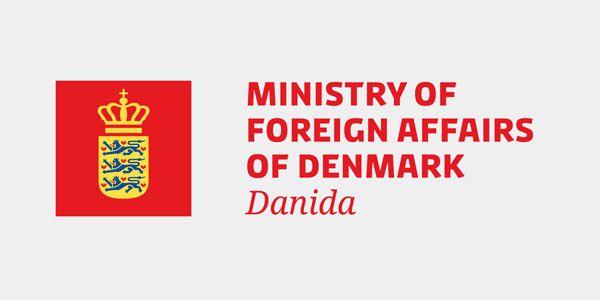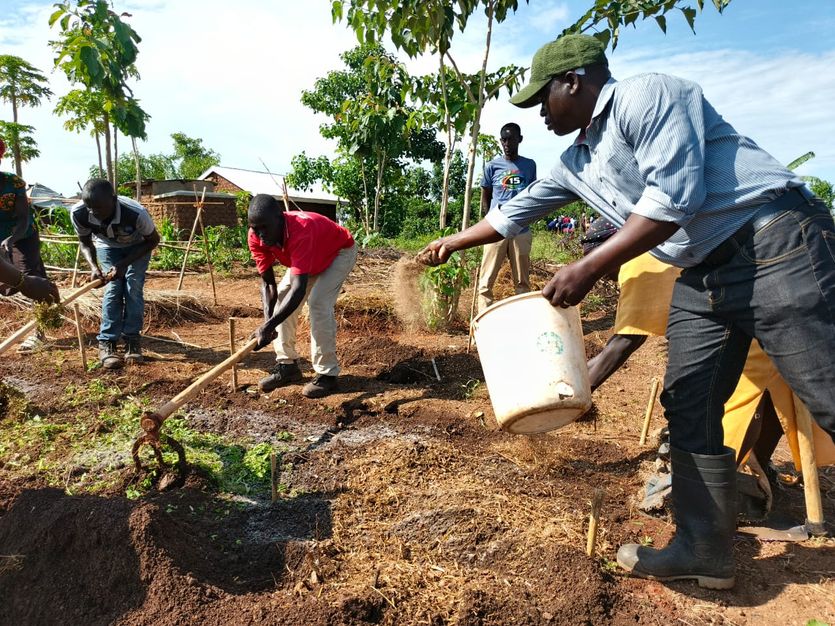A Refugee’s Answer to a Landscape Without Shade
“When I arrived in Imvepi, the heat was unbearable. There was no shade, no trees, just dry land. But now, my home is cool, green, and feeding my family, because of the trees I planted,” says Mahad Emanuel, a refugee and tree grower in Uganda’s Imvepi Refugee Settlement.
In 2017, Mahad fled conflict in South Sudan and found refuge in Uganda. While the settlement offered safety, it came with its own set of challenges: dry, cracked soil, relentless heat, and a glaring absence of trees. For Mahad, survival meant more than shelter; it meant creating a livable home in a place where the environment had little to offer.
Planting Hope: DCA’s Environmental and Energy Project
A turning point came in 2019 when DanChurchAid (DCA), with support from UNHCR and DANIDA, introduced the Environment and Energy Project in the West Nile region. The project, active in Imvepi, Rhino Camp, and Bidibidi refugee settlement, was designed to reverse environmental degradation, promote access to sustainable energy, and help refugee households restore their surroundings.
“DCA gave us fruit tree seedlings, jackfruit, guava, pawpaw, neem, moringa, and Gmelina arborea, which we call white tick,” Mahad recalls. “That’s when I started planting. I was determined to change the heat around my home.”
Today, Mahad planted over 200 trees around his compound. He maintains them with care, pruning, watering with stored rainwater, and enriching the soil with compost and manure.

Beyond cooling, food, income, and dignity
The trees around Mahad’s home have done more than bring shade. “The fruit trees have improved our diet,” he explains. “Before, we always received the same kind of food. Now, we supplement it with guavas, papayas, and jackfruit. The fruits have made a big difference in our meals.”
They’ve also boosted his income. He made UGX 150,000 from jackfruit sales in the first year, UGX 230,000 the next, and now earns about UGX 300,000 annually. With some of that money, he co-financed a motorcycle, which brings in UGX 10,000 daily through a hired rider. “The money supports my family,” he says.
Spreading Roots in the Community
Mahad’s efforts have not gone unnoticed. His compound is now a reference point for others in the community. “Most of my neighbors come to learn from me,” he shares. “Now they also have fruit trees in their compounds, lemons, oranges, jackfruits. DCA gave us the first seedlings, but we’re now expanding it ourselves.”
To keep the momentum going, he started a small nursery, growing seedlings from seeds he collects himself and giving them out freely. “Even if DCA’s support ends, the community will still have a source of seedlings,” he says.

Tackling Environmental Pressure in Refugee Settlements
Environmental pressure remains a major concern across refugee settlements in West Nile. The demand for firewood, timber, and construction materials continues to drive deforestation and strain natural resources.
“In West Nile, the demand for firewood and timber has caused extensive environmental degradation,” says Amos Ongwen, Environment and Energy Manager at DanChurchAid. “We’re addressing this by restoring woodlots with fast-growing species like Acacia grandis, promoting household tree planting, and encouraging the use of energy-efficient stoves.”
The ongoing challenge of water access
Despite his progress, Mahad still faces challenges. Water is scarce, and when it’s available, it’s often unsuitable for trees. “We rely on streams that sometimes dry up. And the chlorine in the available water isn’t good for trees,” he explains. To adapt, Mahad stores rainwater in a large drum and supplements his farming by growing vegetables and rearing poultry and pigs.
He believes more can be done. “If we had better access to water, we could plant even more trees and increase food production,” he says.
A greener future for all
Mahad remains committed to greening his environment. “Even if the project ends, I will continue to grow trees and give seedlings to others. I will keep telling people about the benefits of tree planting, because when we plant more trees, we get more rain, more firewood, more food, and more income. It’s good for our environment and our families.”
What began as a personal struggle against heat and hardship has grown into a living legacy, one that now shades, feeds, and inspires an entire community.
About this project
Project Period: Ongoing since January 2017
Donor: UNHCR and Danida
Theme: Building Resilience and Saving Lives





